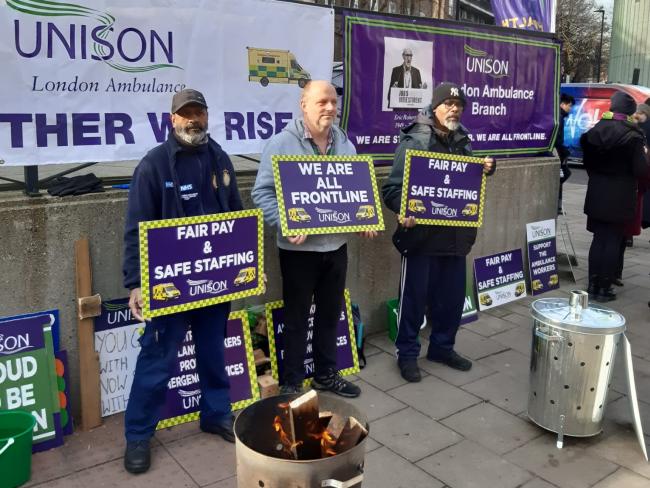16 March 2023

London Ambulance Service workers on strike outside LAS headquarters, Waterloo on 10 February. Photo Workers.
Health workers employed in the NHS have achieved a signal victory in their pay campaign. On 15 March the NHS Staff Council received an improved offer, which will be put to members by their unions with a recommendation to accept. Planned strikes have been called off.
The offer for NHS England workers represents a significant improvement on last summer’s award. It provides for an additional one-off sum for the current year and a 5 per cent pay rise across the board for 2023/24. In addition there’s an increase in the lowest pay rate to £11.45 an hour.
Imposed
After being applauded for their brave and skilful response to the coronavirus pandemic, health workers were rewarded with a pay cut last September. This was imposed without negotiation, or even discussion with their trade unions.
The government both arrogant and complacent believed there would be no response. Despising and undervaluing workers as ever, they believed those in the NHS were exhausted after the strains of the last three years.
Tenacious
The government also believed that anti-union legislation would tie up trade unions and make effective class struggle impossible. They did not expect the tenacious, clever and resolute response that evolved.
Ambulance workers in Unison, striking from December, led the way. They were joined by nurses in the Royal College of Nursing in January, then physiotherapists in February.
‘Government finally realised more and more health workers would join the struggle.’
The penny finally dropped when the government realised that rather than fade away, more and more health workers would join the struggle. From March every ambulance service in England and Wales bar one would be on strike, plus nine other Unison branches, one of which covers the world-famous Great Ormond Street Hospital for Children.
The key moment came when the RCN’s attempt to break ranks and seek a separate deal foundered. The solidarity of the other thirteen NHS Unions, led by Unison, forced negotiations back into the formal negotiating structure of the NHS Staff Council, whose executive was responsible for reaching settlement.
Marker
This victory is important for what the health workers have achieved and is a marker for the future. A large negotiating group, of nearly a million workers, in many diverse unions and professions, faced down a government prepared to see members of the public die rather than settle.
And at the same time the apparently selfish tactics of the RCN, who ought to know better, have been made irrelevant. The discredited government-appointed Pay Review Body should now be dispatched and future pay negotiations honestly faced by the unions making up the staff council.
Determined
Those of an anti-union mindset will question the achievement, whether describing themselves as “left” or “right”. As will those who think the pay review body can provide stability or fairness. But as all unions have been keen to emphasise, it is only the determined action of the health workers that mattered, not their critics.
During the dispute health workers, principally ambulance workers, controlled the NHS for each of the days there was a strike. The lesson should be clear; why only on strike days? The NHS, as the country at large, is ours, it belongs to working people. We must claim it. To be on the defensive isn’t good enough.
